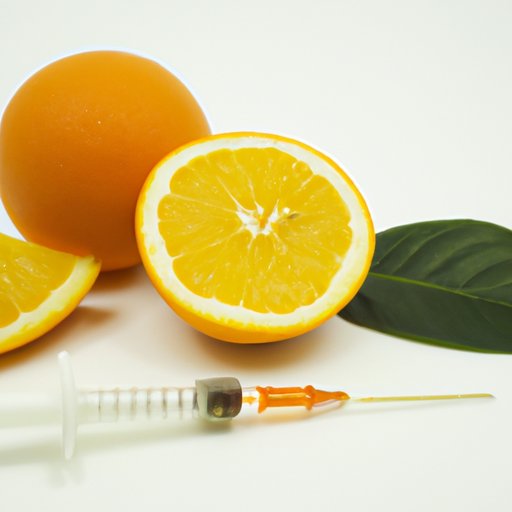
Introduction
The flu can be a debilitating and unpleasant experience for anyone, causing fever, coughing, congestion, sore throat, fatigue, and body aches. However, if you find yourself stricken with the flu, there are numerous ways to speed up your recovery and alleviate your symptoms. This article aims to provide you with natural remedies, over-the-counter medications, and other helpful tips to help you get rid of the flu fast. This article is intended for anyone who wants to learn more about flu recovery and prevention.
Natural Remedies for Alleviating Flu Symptoms
One of the best ways to get rid of the flu fast is to use natural remedies that relieve symptoms. Here are some of the most effective:
Drink herbal teas for relief: Certain herbal teas like ginger, chamomile, and echinacea can help relieve flu symptoms. Ginger tea can help sore throat and congestion, chamomile tea can ease inflammation and promote sleep, while echinacea tea can help boost the immune system.
Take steamy showers to ease congestion: Steam from a hot shower can help loosen mucus and clear up congestion. Additionally, peppermint oil can help open airways and relieve coughing and congestion.
Incorporate foods rich in Vitamin C and zinc: Foods rich in Vitamin C and zinc can help the body fight off flu viruses. Some examples of Vitamin C-rich foods include oranges, kiwis, strawberries, and red peppers, while zinc-rich foods include oysters, beef, pumpkin seeds, and lentils.
Stay well-hydrated to flush out toxins: Drinking plenty of fluids like water, tea, and soup can help flush out toxins and prevent dehydration. Additionally, electrolyte drinks like coconut water and sports drinks can help replenish fluids and minerals.
Rest and Hydration for Speedy Recovery
Getting enough rest and hydration is crucial for a speedy flu recovery. Here are some tips:
Importance of getting enough rest: Rest can help boost the immune system and promote healing. Make sure to get plenty of sleep and avoid strenuous physical activity until your symptoms have subsided.
Increase fluid intake to flush out toxins: Drinking fluids can help flush out toxins and prevent dehydration. Aim to drink at least 8-10 glasses of water a day, and supplement with other fluids like herbal tea, soup, and electrolyte drinks.
Over-The-Counter Flu Medications
If natural remedies and rest are not enough to alleviate your flu symptoms, you may consider taking over-the-counter flu medications. Here are some common ones:
Consider taking medication to alleviate flu symptoms: You can try taking acetaminophen or ibuprofen to help reduce fever and relieve aches and pains. Additionally, decongestants like pseudoephedrine or phenylephrine can help relieve congestion, while expectorants like guaifenesin can help loosen mucus and promote coughing.
Seek Medical Attention if Necessary
In some cases, flu symptoms may require medical attention. Here are some indications that you may need to seek medical help:
Symptoms that may indicate a need for medical attention: If you experience severe symptoms like difficulty breathing, chest pain, persistent vomiting, or confusion, seek medical attention immediately. Additionally, if you are at risk of developing flu complications (such as pneumonia, bronchitis, or ear infection), your doctor may recommend antiviral medication.
Importance of proper medical treatment to prevent complications: If left untreated, the flu can lead to serious complications that can result in hospitalization and even death. Therefore, it is essential to seek medical help if you experience severe or prolonged symptoms.
Vaccination for Prevention
The best way to prevent the flu is to get vaccinated annually. Here’s why:
Benefits of getting vaccinated against the flu: Flu vaccination is the most effective way to prevent the flu and reduce its severity. It can help protect you from getting sick and spreading the virus to others. Additionally, it can help avoid potential complications and hospitalization.
Overview of how flu vaccines work: Flu vaccines work by introducing the immune system to inactive flu viruses, which prompt the production of antibodies that can fight off active flu viruses. There are two main types of vaccines: the trivalent vaccine (protects against three flu strains) and the quadrivalent vaccine (protects against four flu strains).
Avoid Contact with Sick People
Precautions can help prevent the spread of flu viruses. Here are some tips to practice good hygiene and avoid contact with sick people:
Precautions for avoiding the flu: Avoid close contact with people who are sick, cover your mouth and nose when coughing or sneezing, wash your hands regularly with soap and water, avoid touching your eyes, nose, and mouth, and clean and disinfect surfaces regularly.
Conclusion
Getting rid of the flu quickly requires a combination of natural remedies, rest, medication (if needed), and prevention measures. By incorporating these tips into your flu recovery and prevention plan, you can avoid prolonged suffering and enjoy a speedy recovery. Remember to prioritize your health and hygiene, and don’t hesitate to seek medical attention if necessary.





